【单元考点培优】Unit 1 The king's new clothes 考点16:阅读理解-判断-2025-2026学年牛津译林版六年级英语上册核心考点培优精练 (含答案解析)
文档属性
| 名称 | 【单元考点培优】Unit 1 The king's new clothes 考点16:阅读理解-判断-2025-2026学年牛津译林版六年级英语上册核心考点培优精练 (含答案解析) | 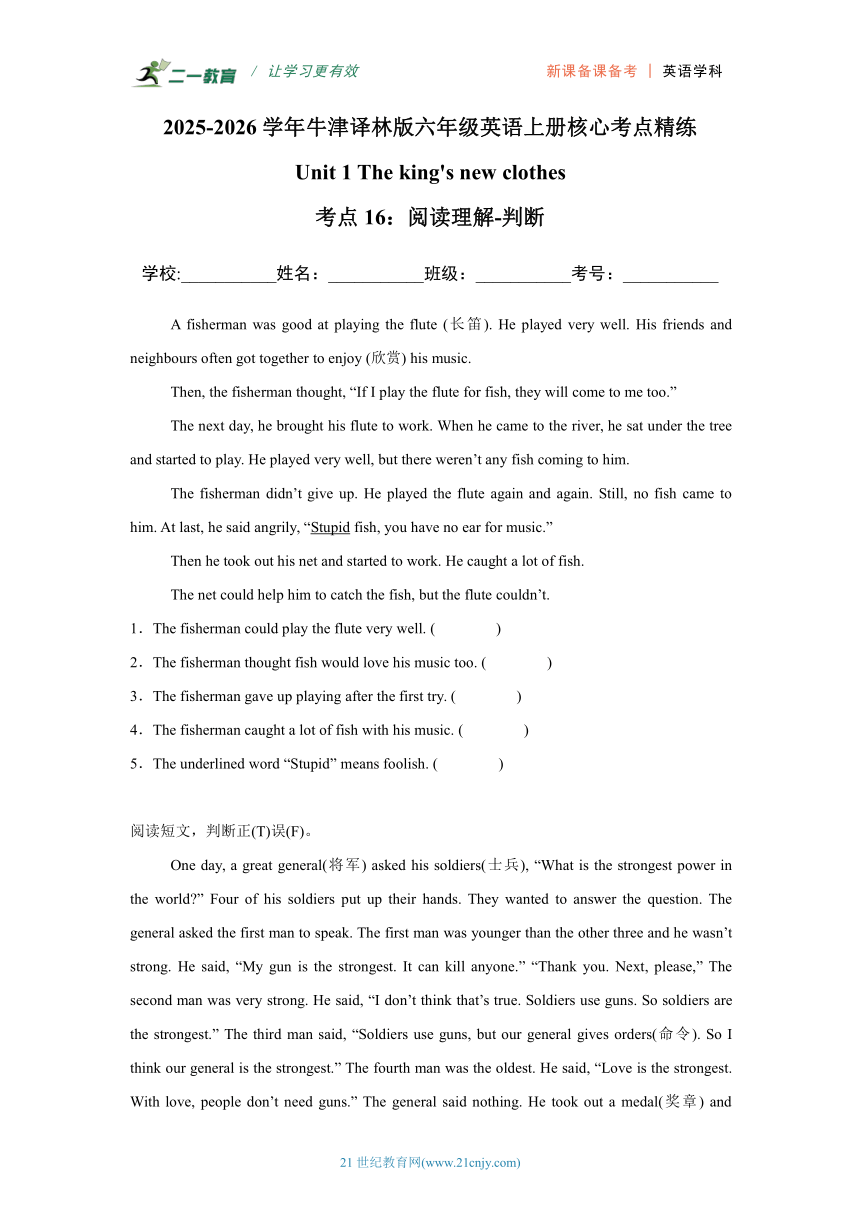 | |
| 格式 | docx | ||
| 文件大小 | 48.0KB | ||
| 资源类型 | 试卷 | ||
| 版本资源 | 牛津译林版 | ||
| 科目 | 英语 | ||
| 更新时间 | 2025-07-29 08:44:30 | ||
图片预览

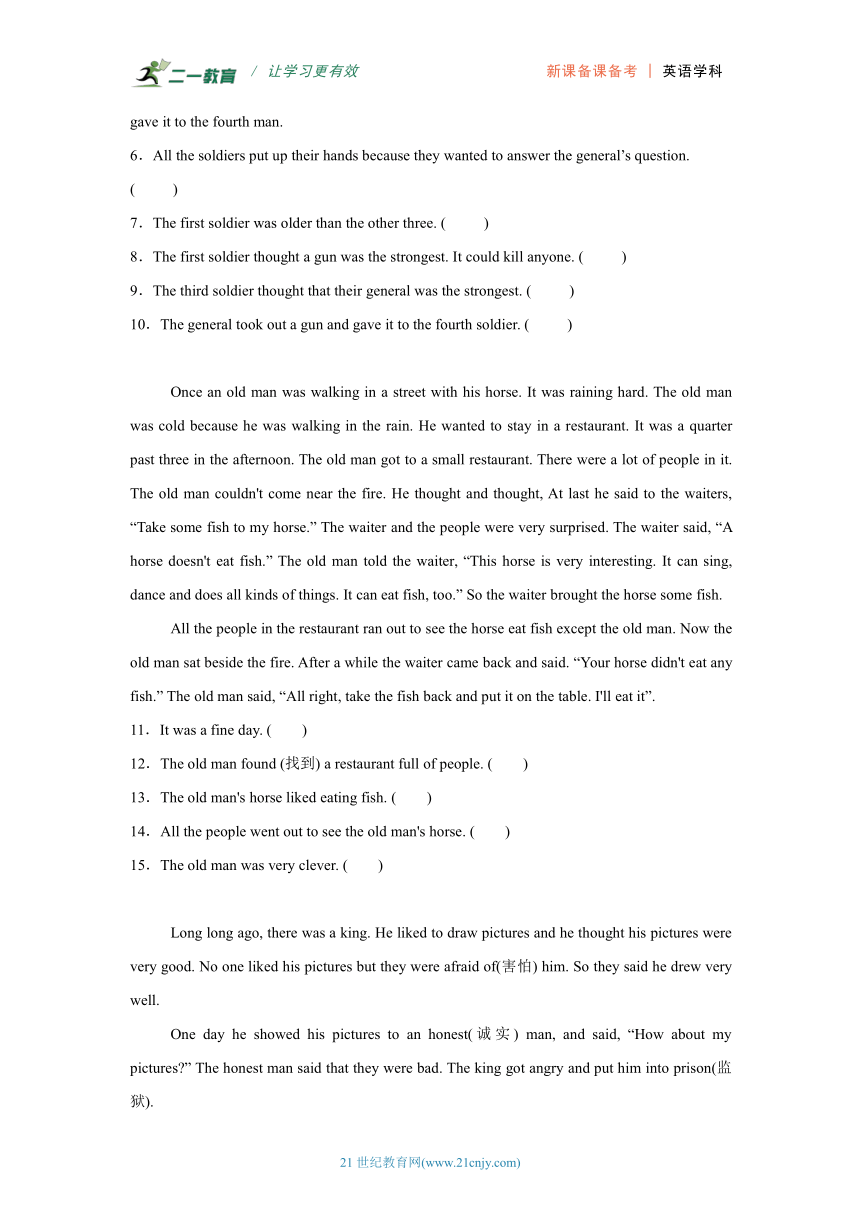
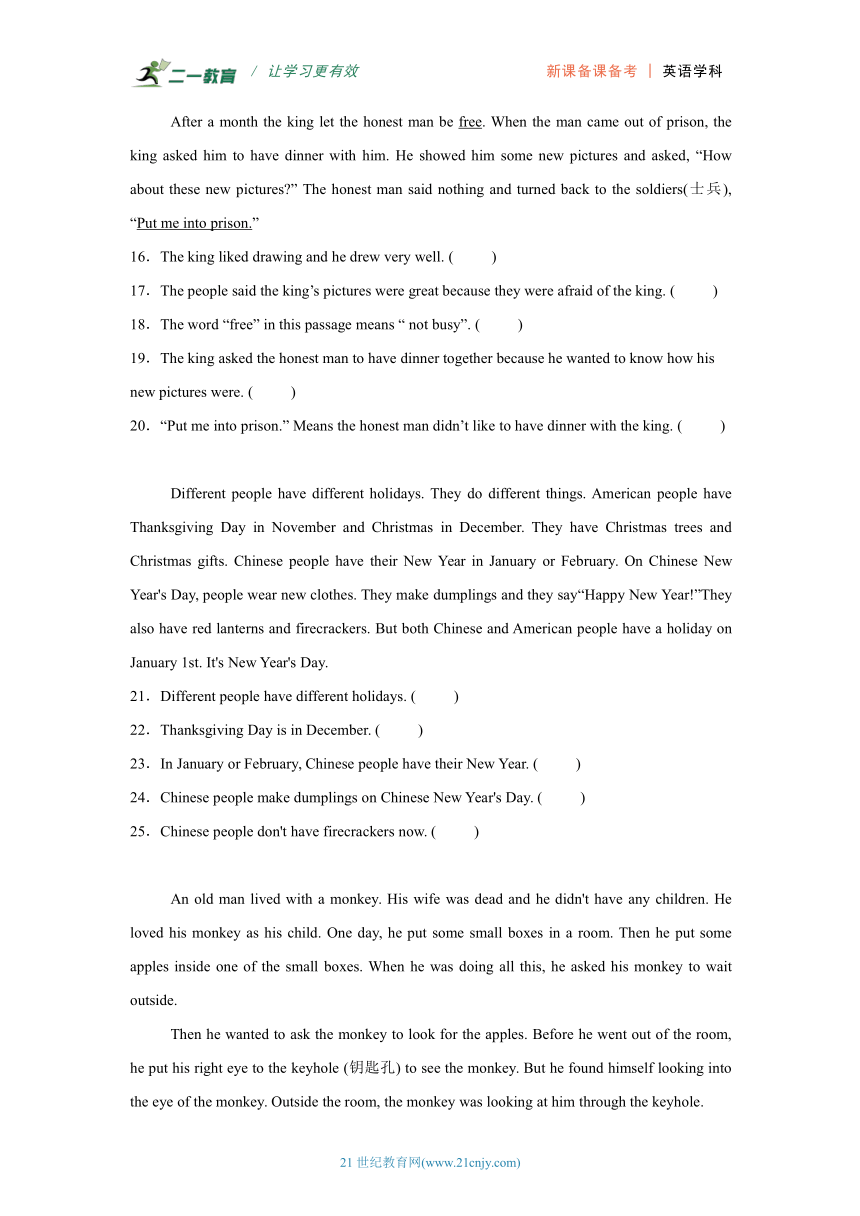
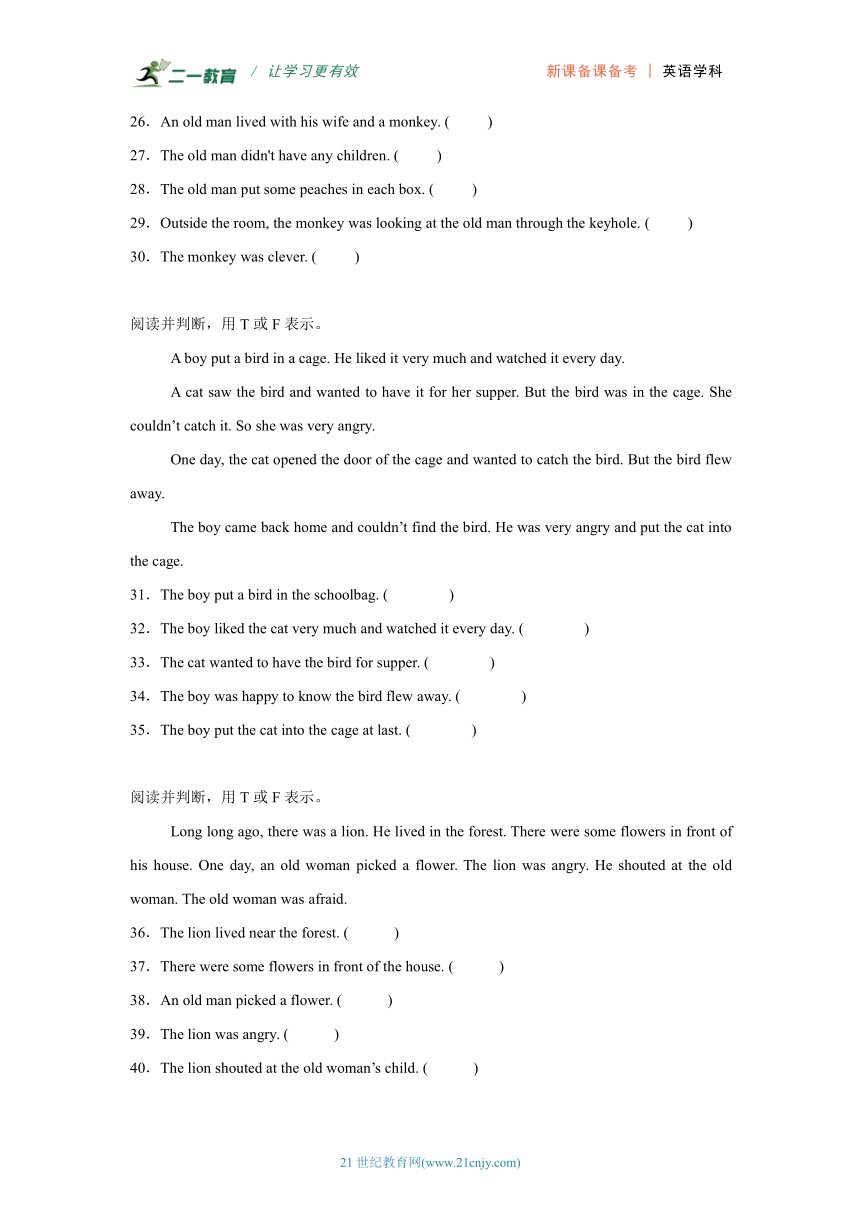
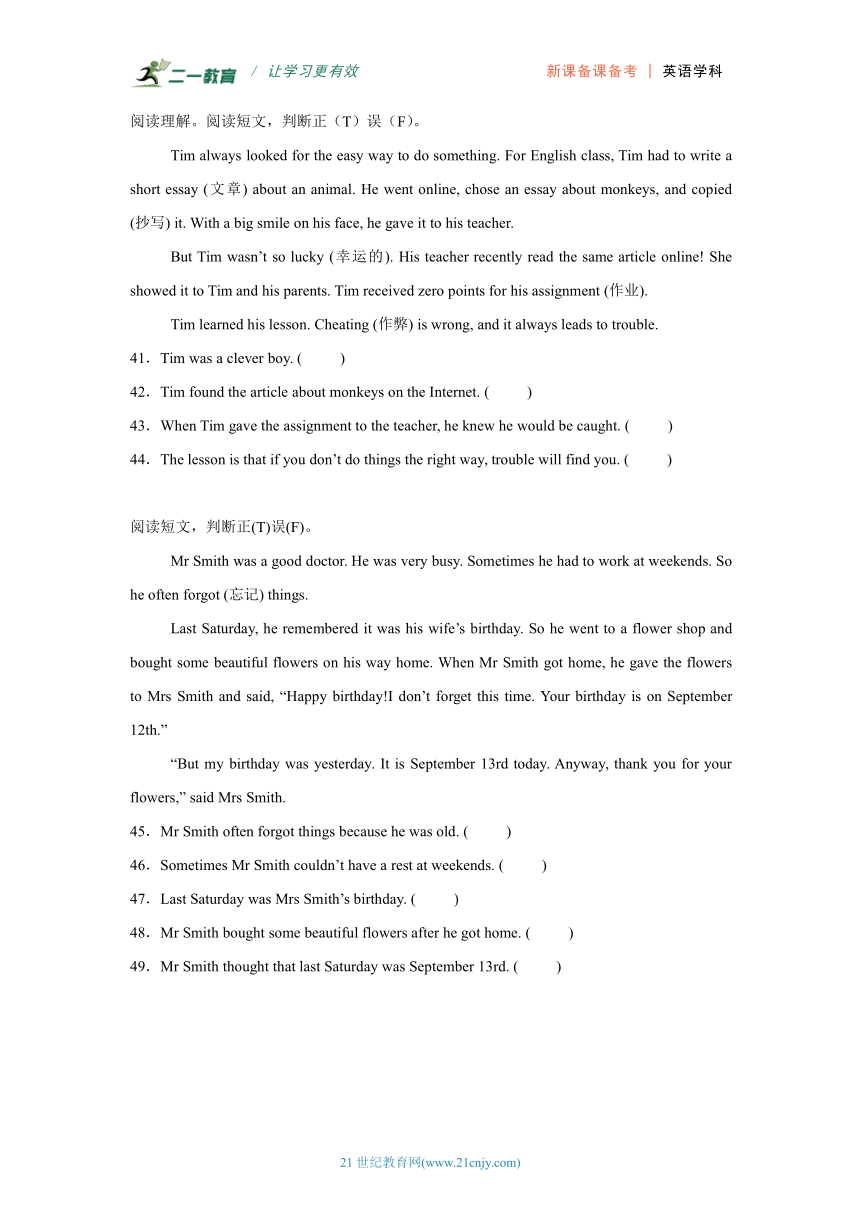
文档简介
/ 让学习更有效 新课备课备考 | 英语学科
/ 让学习更有效 新课备课备考 | 英语学科
2025-2026学年牛津译林版六年级英语上册核心考点精练
Unit 1 The king's new clothes
考点16:阅读理解-判断
学校:___________姓名:___________班级:___________考号:___________
A fisherman was good at playing the flute (长笛). He played very well. His friends and neighbours often got together to enjoy (欣赏) his music.
Then, the fisherman thought, “If I play the flute for fish, they will come to me too.”
The next day, he brought his flute to work. When he came to the river, he sat under the tree and started to play. He played very well, but there weren’t any fish coming to him.
The fisherman didn’t give up. He played the flute again and again. Still, no fish came to him. At last, he said angrily, “Stupid fish, you have no ear for music.”
Then he took out his net and started to work. He caught a lot of fish.
The net could help him to catch the fish, but the flute couldn’t.
1.The fisherman could play the flute very well. ( )
2.The fisherman thought fish would love his music too. ( )
3.The fisherman gave up playing after the first try. ( )
4.The fisherman caught a lot of fish with his music. ( )
5.The underlined word “Stupid” means foolish. ( )
阅读短文,判断正(T)误(F)。
One day, a great general(将军) asked his soldiers(士兵), “What is the strongest power in the world ” Four of his soldiers put up their hands. They wanted to answer the question. The general asked the first man to speak. The first man was younger than the other three and he wasn’t strong. He said, “My gun is the strongest. It can kill anyone.” “Thank you. Next, please,” The second man was very strong. He said, “I don’t think that’s true. Soldiers use guns. So soldiers are the strongest.” The third man said, “Soldiers use guns, but our general gives orders(命令). So I think our general is the strongest.” The fourth man was the oldest. He said, “Love is the strongest. With love, people don’t need guns.” The general said nothing. He took out a medal(奖章) and gave it to the fourth man.
6.All the soldiers put up their hands because they wanted to answer the general’s question. ( )
7.The first soldier was older than the other three. ( )
8.The first soldier thought a gun was the strongest. It could kill anyone. ( )
9.The third soldier thought that their general was the strongest. ( )
10.The general took out a gun and gave it to the fourth soldier. ( )
Once an old man was walking in a street with his horse. It was raining hard. The old man was cold because he was walking in the rain. He wanted to stay in a restaurant. It was a quarter past three in the afternoon. The old man got to a small restaurant. There were a lot of people in it. The old man couldn't come near the fire. He thought and thought, At last he said to the waiters, “Take some fish to my horse.” The waiter and the people were very surprised. The waiter said, “A horse doesn't eat fish.” The old man told the waiter, “This horse is very interesting. It can sing, dance and does all kinds of things. It can eat fish, too.” So the waiter brought the horse some fish.
All the people in the restaurant ran out to see the horse eat fish except the old man. Now the old man sat beside the fire. After a while the waiter came back and said. “Your horse didn't eat any fish.” The old man said, “All right, take the fish back and put it on the table. I'll eat it”.
11.It was a fine day. ( )
12.The old man found (找到) a restaurant full of people. ( )
13.The old man's horse liked eating fish. ( )
14.All the people went out to see the old man's horse. ( )
15.The old man was very clever. ( )
Long long ago, there was a king. He liked to draw pictures and he thought his pictures were very good. No one liked his pictures but they were afraid of(害怕) him. So they said he drew very well.
One day he showed his pictures to an honest(诚实) man, and said, “How about my pictures ” The honest man said that they were bad. The king got angry and put him into prison(监狱).
After a month the king let the honest man be free. When the man came out of prison, the king asked him to have dinner with him. He showed him some new pictures and asked, “How about these new pictures ” The honest man said nothing and turned back to the soldiers(士兵), “Put me into prison.”
16.The king liked drawing and he drew very well. ( )
17.The people said the king’s pictures were great because they were afraid of the king. ( )
18.The word “free” in this passage means “ not busy”. ( )
19.The king asked the honest man to have dinner together because he wanted to know how his new pictures were. ( )
20.“Put me into prison.” Means the honest man didn’t like to have dinner with the king. ( )
Different people have different holidays. They do different things. American people have Thanksgiving Day in November and Christmas in December. They have Christmas trees and Christmas gifts. Chinese people have their New Year in January or February. On Chinese New Year's Day, people wear new clothes. They make dumplings and they say“Happy New Year!”They also have red lanterns and firecrackers. But both Chinese and American people have a holiday on January 1st. It's New Year's Day.
21.Different people have different holidays. ( )
22.Thanksgiving Day is in December. ( )
23.In January or February, Chinese people have their New Year. ( )
24.Chinese people make dumplings on Chinese New Year's Day. ( )
25.Chinese people don't have firecrackers now. ( )
An old man lived with a monkey. His wife was dead and he didn't have any children. He loved his monkey as his child. One day, he put some small boxes in a room. Then he put some apples inside one of the small boxes. When he was doing all this, he asked his monkey to wait outside.
Then he wanted to ask the monkey to look for the apples. Before he went out of the room, he put his right eye to the keyhole (钥匙孔) to see the monkey. But he found himself looking into the eye of the monkey. Outside the room, the monkey was looking at him through the keyhole.
26.An old man lived with his wife and a monkey. ( )
27.The old man didn't have any children. ( )
28.The old man put some peaches in each box. ( )
29.Outside the room, the monkey was looking at the old man through the keyhole. ( )
30.The monkey was clever. ( )
阅读并判断,用T或F表示。
A boy put a bird in a cage. He liked it very much and watched it every day.
A cat saw the bird and wanted to have it for her supper. But the bird was in the cage. She couldn’t catch it. So she was very angry.
One day, the cat opened the door of the cage and wanted to catch the bird. But the bird flew away.
The boy came back home and couldn’t find the bird. He was very angry and put the cat into the cage.
31.The boy put a bird in the schoolbag. ( )
32.The boy liked the cat very much and watched it every day. ( )
33.The cat wanted to have the bird for supper. ( )
34.The boy was happy to know the bird flew away. ( )
35.The boy put the cat into the cage at last. ( )
阅读并判断,用T或F表示。
Long long ago, there was a lion. He lived in the forest. There were some flowers in front of his house. One day, an old woman picked a flower. The lion was angry. He shouted at the old woman. The old woman was afraid.
36.The lion lived near the forest. ( )
37.There were some flowers in front of the house. ( )
38.An old man picked a flower. ( )
39.The lion was angry. ( )
40.The lion shouted at the old woman’s child. ( )
阅读理解。阅读短文,判断正(T)误(F)。
Tim always looked for the easy way to do something. For English class, Tim had to write a short essay (文章) about an animal. He went online, chose an essay about monkeys, and copied (抄写) it. With a big smile on his face, he gave it to his teacher.
But Tim wasn’t so lucky (幸运的). His teacher recently read the same article online! She showed it to Tim and his parents. Tim received zero points for his assignment (作业).
Tim learned his lesson. Cheating (作弊) is wrong, and it always leads to trouble.
41.Tim was a clever boy. ( )
42.Tim found the article about monkeys on the Internet. ( )
43.When Tim gave the assignment to the teacher, he knew he would be caught. ( )
44.The lesson is that if you don’t do things the right way, trouble will find you. ( )
阅读短文,判断正(T)误(F)。
Mr Smith was a good doctor. He was very busy. Sometimes he had to work at weekends. So he often forgot (忘记) things.
Last Saturday, he remembered it was his wife’s birthday. So he went to a flower shop and bought some beautiful flowers on his way home. When Mr Smith got home, he gave the flowers to Mrs Smith and said, “Happy birthday!I don’t forget this time. Your birthday is on September 12th.”
“But my birthday was yesterday. It is September 13rd today. Anyway, thank you for your flowers,” said Mrs Smith.
45.Mr Smith often forgot things because he was old. ( )
46.Sometimes Mr Smith couldn’t have a rest at weekends. ( )
47.Last Saturday was Mrs Smith’s birthday. ( )
48.Mr Smith bought some beautiful flowers after he got home. ( )
49.Mr Smith thought that last Saturday was September 13rd. ( )
/ 让学习更有效 新课备课备考 | 英语学科
/ 让学习更有效 新课备课备考 | 英语学科
21世纪教育网(www.21cnjy.com)
21世纪教育网(www.21cnjy.com)
参考答案及试题解析
1.T 2.T 3.F 4.F 5.T
【导语】本文讲的是一个渔夫想用吹笛子来吸引鱼,但是鱼听不懂,一条鱼也没有钓到,最后渔夫拿出网开始工作,他钓到了很多鱼。
1.句意:渔夫的笛子吹得很好。根据文中句子“A fisherman was good at playing the flute (长笛). ”得知渔夫擅长吹笛子。题干与原文相符合,故答案为T。
2.句意:渔夫认为鱼也会喜欢他的音乐。根据文中句子“ If I play the flute for fish, they will come to me too.” 得知渔夫认为如果他为鱼吹笛子,它们也会来找他。题干与原文相符合,故答案为T。
3.句意:渔夫第一次尝试后就放弃了。根据文中句子“The fisherman didn’t give up. He played the flute again and again.”得知渔夫没有放弃。他一遍又一遍地吹笛子。题干与原文不符合,故答案为F。
4.句意:渔夫用他的音乐钓了很多鱼。根据文中句子“Still, no fish came to him. At last, he said angrily, “Stupid fish, you have no ear for music.””得知没有鱼来找他。最后,他生气地说:“傻鱼,你没有音乐的耳朵。题干与原文不符合,故答案为F。
5.句意:带下划线的单词“愚蠢”表示愚蠢。根据英语stupid得知汉语是愚蠢的意思,题干与原文相符合,故答案为T。
6.F 7.F 8.T 9.T 10.F
【导语】本文主要介绍了将军问士兵,什么是世界上最强的,四个士兵的回答。
6.句意:所有的士兵都举起手,因为他们想要回答将军的问题。根据“ Four of his soldiers put up their hands. ”可知是四个士兵举起了手,句子和短文内容不符,故答案为F。
7.句意:第一个士兵比其他三个要老。根据“The first man was younger than the other three”可知第一个士兵起其他三个要年轻,句子和短文内容不符,故答案为F。
8.句意:第一个士兵认为枪是最强的。它可以杀死任何人。根据“My gun is the strongest. It can kill anyone.”可知第一个士兵认为他的枪是最强的。它可以杀死任何人,句子和短文内容相符,故答案为T。
9.句意:第三个士兵认为将军是最强的。根据“The third man said, “Soldiers use guns, but our general gives orders(命令). So I think our general is the strongest.” ”可知第三个士兵认为将军是最强的,句子和短文内容相符,故答案为T。
10.句意:将军拿出一把枪,并且把它给了第四个士兵。根据“He took out a medal(奖章) and gave it to the fourth man.”可知将军拿出一枚奖章,给了第四个士兵,句子和短文内容不符,故答案为F。
11.F 12.T 13.F 14.T 15.T
【分析】本文讲了一位老人大雨中走进了一家餐馆,因无法靠近火炉旁,告诉服务员他的马能吃鱼,其他人很好奇,都出去看,老人最后坐在了火炉旁。
11.句意:那是一个晴朗的日子。根据It was raining hard.,可知是下雨的日子,故答案为F。
12.句意:老人找到了一个挤满人的餐馆。根据The old man got to a small restaurant. There were a lot of people in it.,可知老人找到了一个挤满人的餐馆,故答案为T。
13.句意:老人的马喜欢吃鱼。根据Your horse didn't eat any fish.,可知老人的马不喜欢吃鱼,故答案为F。
14.句意:所有的人都出去看老人的马。根据All the people in the restaurant ran out to see the horse eat fish except the old man.,可知所有的人都出去看老人的马,故答案为T。
15.句意:老人很聪明。根据文章描述可知老人很聪明,故答案为T
16.F 17.T 18.F 19.T 20.F
【导语】本文讲述了一位爱好画画的国王画得不好,诚实的人评价他的画被关进监狱的故事。
16.句意:国王喜欢画画,他画得很好。根据文中“No one liked his pictures but they were afraid of him.”可知国王画得不好,故答案为F。
17.句意:人们说国王的画好是因为他们怕国王。根据文中“No one liked his pictures but they were afraid of him. So they said he drew very well.”可知人们说国王的画好是因为他们怕国王,故答案为T。
18.句意:这篇文章中的单词“free”意思是“不忙”。根据文中“When the man came out of prison, the king asked him to have dinner with him.”可知单词“free”的意思是“被释放”,故答案为F。
19.句意:国王让这个诚实的人和他共进晚餐是因为他想知道他的新画怎么样。根据文中“He showed him some new pictures and asked, ‘How about these new pictures ’”可知国王让这个诚实的人和他共进晚餐是因为他想知道他的新画怎么样,故答案为T。
20.句意:“把我关进监狱吧。”意思是这个诚实的人不想和国王共进晚餐。根据原文可知,这个诚实的人认为国王的新画画得不好,所以让国王把自己再关进监狱的,故答案为F。
21.T 22.F 23.T 24.T 25.F
【分析】短文大意:短文介绍了不同的人们有不同的节日。
21.句意:不同的人们有不同的节日。根据短文中的Different people have different holidays.不同的人们有不同的节日。可知该句与短文相符,故答案为T。
22.句意:感恩节在12月份。根据短文中的American people have Thanksgiving Day in November美国人在11月份有感恩节。可知该句与短文不符,故答案为F。
23.句意:在一月份或二月份,中国人民有春节。根据短文中的Chinese people have their New Year in January or February.在一月份或二月份,中国人民有他们的春节。可知该句与短文相符,故答案为T。
24.句意:在春节中国人民包饺子。根据短文中的They make dumplings and they say“Happy New Year!他们包饺子并且问过年好。可知该句与短文相符,故答案为T。
25.句意:中国人民现在没有鞭炮。根据短文中的They also have red lanterns and firecrackers. 他们还有红灯笼和鞭炮。可知该句与短文不符,故答案为F。
26.F 27.T 28.F 29.T 30.T
【分析】文章讲的是一位老人和猴子的故事。
26.句意:一个老人和他的妻子和一只猴子住在一起。由句子An old man lived with a monkey. His wife was dead and he didn't have any children. 可知妻子死了,和猴子住在一起,故答案为F。
27.句意:老人没有孩子。由句子His wife was dead and he didn't have any children.可知没有孩子,故答案为T。
28.句意:老人在每个盒子里放了一些桃子。由句子One day, he put some small boxes in a room. Then he put some apples inside one of the small boxes. 可知放了一些苹果,故答案为F。
29.句意:在房间外面,猴子通过钥匙孔看老人。由句子Outside the room, the monkey was looking at him through the keyhole.可知是通过钥匙孔,故答案为T。
30.句意:猴子是聪明的。由文章可知猴子很聪明。故答案为T。
31.F 32.F 33.T 34.F 35.T
【解析】31.句意为男孩在书包里放了只鸟。由短文中的关键句“A boy put a bird in a cage.”可知一个男孩把一只鸟放到一个笼子里,不是放到书包里,故答案为F。
32.句意为这个男孩非常喜欢这只猫,每天都看着它。由短文中的关键句“He liked it very much and watched it every day.”可知男孩很喜欢这只鸟并且每天都看它,而不是猫,故答案为F。
33.句意为猫想把鸟当晚餐。由短文中的关键句“A cat saw the bird and wanted to have it for her supper.”可知猫看着这只鸟并且想要吃掉它作为晚餐,故答案为T。
34.句意为男孩很高兴知道鸟儿飞走了。由短文中的关键句“The boy came back home and couldn’t find the bird. He was very angry.”可知男孩知道鸟飞走了很生气,而不是开心,故答案为F。
35.句意为男孩终于把猫放进笼子里了。由短文中的关键句“put the cat into the cage.”可知男孩把猫放进了笼子,与本题相符。故答案为T。
36.F 37.T 38.F 39.T 40.F
【分析】短文大意:狮子和老太太的故事。
36.句意:狮子住在森林旁边。由短文中的关键句Long long ago, there was a lion . He lived in the forest.可知狮子住在森林里,不是在森林旁边,故该句是错误的,故答案为F。
37.句意:在房子的前面有一些花。由短文中的关键句There were some flowers in front of his house.可知他的房子前面有一些花,故该句是正确的,故答案为T。
38.句意:一个年老的男人摘了一朵花。由短文中的关键句One day, an old woman picked a flower.可知是一位年老的女人摘了花,故该句是错误的,故答案为F。
39.句意:狮子很生气。由短文中的关键句The lion was angry.可知狮子很生气,故该句是正确的,故答案为T。
40.句意:狮子冲着那个老太太的孩子大喊。由短文中的关键句He shouted at the old woman.可知狮子朝着那个老太太大喊,故该句是错误的,故答案为F。
41.F 42.T 43.F 44.T
【解析】41.题干句意:蒂姆是个聪明的男孩。根据文章描述可知蒂姆不聪明,表述不正确,故答案为F。
42.题干句意:蒂姆在网上找到了那篇关于猴子的文章。根据 He went online, chose an essay about monkeys, and copied (抄写) it. 可知表述正确,故答案为T。
43.题干句意:当蒂姆把作业交给老师时,他知道自己会被抓住的。根据With a big smile on his face, he gave it to his teacher.可知他不知道,表述不正确,故答案为F。
44.题干句意:教训是如果你做事不正确,麻烦就会找上门来。根据Cheating (作弊) is wrong, and it always leads to trouble.可知表述正确,故答案为T。
45.F 46.T 47.F 48.F 49.F
【解析】45.题干句意:史密斯先生经常因为年老而忘记一些事情。根据He was very busy. Sometimes he had to work at weekends. So he often forgot (忘记) things.可知是因为忙碌忘记不是因为年老,题干表述不正确,故答案为F。
46.题干句意:有时史密斯先生周末不能休息。根据Sometimes he had to work at weekends.可知题干表述正确,故答案为T。
47.题干句意:上周六是史密斯太太的生日。根据Last Saturday, he remembered it was his wife’s birthday. But my birthday was yesterday. 可知史密斯太太的生日是上周五,题干表述不正确,故答案为F。
48.题干句意:史密斯先生回家后买了一些漂亮的花。根据So he went to a flower shop and bought some beautiful flowers on his way home.可知是在回家的路上买的,题干表述不正确,故答案为F。
49.题干句意:史密斯先生以为上周六是9月13日。根据“Happy birthday!I don’t forget this time. Your birthday is on September 12th.”可知史密斯先生以为上周六是9月12日。题干表述不正确,故答案为F。
21世纪教育网(www.21cnjy.com)
21世纪教育网(www.21cnjy.com)
/ 让学习更有效 新课备课备考 | 英语学科
2025-2026学年牛津译林版六年级英语上册核心考点精练
Unit 1 The king's new clothes
考点16:阅读理解-判断
学校:___________姓名:___________班级:___________考号:___________
A fisherman was good at playing the flute (长笛). He played very well. His friends and neighbours often got together to enjoy (欣赏) his music.
Then, the fisherman thought, “If I play the flute for fish, they will come to me too.”
The next day, he brought his flute to work. When he came to the river, he sat under the tree and started to play. He played very well, but there weren’t any fish coming to him.
The fisherman didn’t give up. He played the flute again and again. Still, no fish came to him. At last, he said angrily, “Stupid fish, you have no ear for music.”
Then he took out his net and started to work. He caught a lot of fish.
The net could help him to catch the fish, but the flute couldn’t.
1.The fisherman could play the flute very well. ( )
2.The fisherman thought fish would love his music too. ( )
3.The fisherman gave up playing after the first try. ( )
4.The fisherman caught a lot of fish with his music. ( )
5.The underlined word “Stupid” means foolish. ( )
阅读短文,判断正(T)误(F)。
One day, a great general(将军) asked his soldiers(士兵), “What is the strongest power in the world ” Four of his soldiers put up their hands. They wanted to answer the question. The general asked the first man to speak. The first man was younger than the other three and he wasn’t strong. He said, “My gun is the strongest. It can kill anyone.” “Thank you. Next, please,” The second man was very strong. He said, “I don’t think that’s true. Soldiers use guns. So soldiers are the strongest.” The third man said, “Soldiers use guns, but our general gives orders(命令). So I think our general is the strongest.” The fourth man was the oldest. He said, “Love is the strongest. With love, people don’t need guns.” The general said nothing. He took out a medal(奖章) and gave it to the fourth man.
6.All the soldiers put up their hands because they wanted to answer the general’s question. ( )
7.The first soldier was older than the other three. ( )
8.The first soldier thought a gun was the strongest. It could kill anyone. ( )
9.The third soldier thought that their general was the strongest. ( )
10.The general took out a gun and gave it to the fourth soldier. ( )
Once an old man was walking in a street with his horse. It was raining hard. The old man was cold because he was walking in the rain. He wanted to stay in a restaurant. It was a quarter past three in the afternoon. The old man got to a small restaurant. There were a lot of people in it. The old man couldn't come near the fire. He thought and thought, At last he said to the waiters, “Take some fish to my horse.” The waiter and the people were very surprised. The waiter said, “A horse doesn't eat fish.” The old man told the waiter, “This horse is very interesting. It can sing, dance and does all kinds of things. It can eat fish, too.” So the waiter brought the horse some fish.
All the people in the restaurant ran out to see the horse eat fish except the old man. Now the old man sat beside the fire. After a while the waiter came back and said. “Your horse didn't eat any fish.” The old man said, “All right, take the fish back and put it on the table. I'll eat it”.
11.It was a fine day. ( )
12.The old man found (找到) a restaurant full of people. ( )
13.The old man's horse liked eating fish. ( )
14.All the people went out to see the old man's horse. ( )
15.The old man was very clever. ( )
Long long ago, there was a king. He liked to draw pictures and he thought his pictures were very good. No one liked his pictures but they were afraid of(害怕) him. So they said he drew very well.
One day he showed his pictures to an honest(诚实) man, and said, “How about my pictures ” The honest man said that they were bad. The king got angry and put him into prison(监狱).
After a month the king let the honest man be free. When the man came out of prison, the king asked him to have dinner with him. He showed him some new pictures and asked, “How about these new pictures ” The honest man said nothing and turned back to the soldiers(士兵), “Put me into prison.”
16.The king liked drawing and he drew very well. ( )
17.The people said the king’s pictures were great because they were afraid of the king. ( )
18.The word “free” in this passage means “ not busy”. ( )
19.The king asked the honest man to have dinner together because he wanted to know how his new pictures were. ( )
20.“Put me into prison.” Means the honest man didn’t like to have dinner with the king. ( )
Different people have different holidays. They do different things. American people have Thanksgiving Day in November and Christmas in December. They have Christmas trees and Christmas gifts. Chinese people have their New Year in January or February. On Chinese New Year's Day, people wear new clothes. They make dumplings and they say“Happy New Year!”They also have red lanterns and firecrackers. But both Chinese and American people have a holiday on January 1st. It's New Year's Day.
21.Different people have different holidays. ( )
22.Thanksgiving Day is in December. ( )
23.In January or February, Chinese people have their New Year. ( )
24.Chinese people make dumplings on Chinese New Year's Day. ( )
25.Chinese people don't have firecrackers now. ( )
An old man lived with a monkey. His wife was dead and he didn't have any children. He loved his monkey as his child. One day, he put some small boxes in a room. Then he put some apples inside one of the small boxes. When he was doing all this, he asked his monkey to wait outside.
Then he wanted to ask the monkey to look for the apples. Before he went out of the room, he put his right eye to the keyhole (钥匙孔) to see the monkey. But he found himself looking into the eye of the monkey. Outside the room, the monkey was looking at him through the keyhole.
26.An old man lived with his wife and a monkey. ( )
27.The old man didn't have any children. ( )
28.The old man put some peaches in each box. ( )
29.Outside the room, the monkey was looking at the old man through the keyhole. ( )
30.The monkey was clever. ( )
阅读并判断,用T或F表示。
A boy put a bird in a cage. He liked it very much and watched it every day.
A cat saw the bird and wanted to have it for her supper. But the bird was in the cage. She couldn’t catch it. So she was very angry.
One day, the cat opened the door of the cage and wanted to catch the bird. But the bird flew away.
The boy came back home and couldn’t find the bird. He was very angry and put the cat into the cage.
31.The boy put a bird in the schoolbag. ( )
32.The boy liked the cat very much and watched it every day. ( )
33.The cat wanted to have the bird for supper. ( )
34.The boy was happy to know the bird flew away. ( )
35.The boy put the cat into the cage at last. ( )
阅读并判断,用T或F表示。
Long long ago, there was a lion. He lived in the forest. There were some flowers in front of his house. One day, an old woman picked a flower. The lion was angry. He shouted at the old woman. The old woman was afraid.
36.The lion lived near the forest. ( )
37.There were some flowers in front of the house. ( )
38.An old man picked a flower. ( )
39.The lion was angry. ( )
40.The lion shouted at the old woman’s child. ( )
阅读理解。阅读短文,判断正(T)误(F)。
Tim always looked for the easy way to do something. For English class, Tim had to write a short essay (文章) about an animal. He went online, chose an essay about monkeys, and copied (抄写) it. With a big smile on his face, he gave it to his teacher.
But Tim wasn’t so lucky (幸运的). His teacher recently read the same article online! She showed it to Tim and his parents. Tim received zero points for his assignment (作业).
Tim learned his lesson. Cheating (作弊) is wrong, and it always leads to trouble.
41.Tim was a clever boy. ( )
42.Tim found the article about monkeys on the Internet. ( )
43.When Tim gave the assignment to the teacher, he knew he would be caught. ( )
44.The lesson is that if you don’t do things the right way, trouble will find you. ( )
阅读短文,判断正(T)误(F)。
Mr Smith was a good doctor. He was very busy. Sometimes he had to work at weekends. So he often forgot (忘记) things.
Last Saturday, he remembered it was his wife’s birthday. So he went to a flower shop and bought some beautiful flowers on his way home. When Mr Smith got home, he gave the flowers to Mrs Smith and said, “Happy birthday!I don’t forget this time. Your birthday is on September 12th.”
“But my birthday was yesterday. It is September 13rd today. Anyway, thank you for your flowers,” said Mrs Smith.
45.Mr Smith often forgot things because he was old. ( )
46.Sometimes Mr Smith couldn’t have a rest at weekends. ( )
47.Last Saturday was Mrs Smith’s birthday. ( )
48.Mr Smith bought some beautiful flowers after he got home. ( )
49.Mr Smith thought that last Saturday was September 13rd. ( )
/ 让学习更有效 新课备课备考 | 英语学科
/ 让学习更有效 新课备课备考 | 英语学科
21世纪教育网(www.21cnjy.com)
21世纪教育网(www.21cnjy.com)
参考答案及试题解析
1.T 2.T 3.F 4.F 5.T
【导语】本文讲的是一个渔夫想用吹笛子来吸引鱼,但是鱼听不懂,一条鱼也没有钓到,最后渔夫拿出网开始工作,他钓到了很多鱼。
1.句意:渔夫的笛子吹得很好。根据文中句子“A fisherman was good at playing the flute (长笛). ”得知渔夫擅长吹笛子。题干与原文相符合,故答案为T。
2.句意:渔夫认为鱼也会喜欢他的音乐。根据文中句子“ If I play the flute for fish, they will come to me too.” 得知渔夫认为如果他为鱼吹笛子,它们也会来找他。题干与原文相符合,故答案为T。
3.句意:渔夫第一次尝试后就放弃了。根据文中句子“The fisherman didn’t give up. He played the flute again and again.”得知渔夫没有放弃。他一遍又一遍地吹笛子。题干与原文不符合,故答案为F。
4.句意:渔夫用他的音乐钓了很多鱼。根据文中句子“Still, no fish came to him. At last, he said angrily, “Stupid fish, you have no ear for music.””得知没有鱼来找他。最后,他生气地说:“傻鱼,你没有音乐的耳朵。题干与原文不符合,故答案为F。
5.句意:带下划线的单词“愚蠢”表示愚蠢。根据英语stupid得知汉语是愚蠢的意思,题干与原文相符合,故答案为T。
6.F 7.F 8.T 9.T 10.F
【导语】本文主要介绍了将军问士兵,什么是世界上最强的,四个士兵的回答。
6.句意:所有的士兵都举起手,因为他们想要回答将军的问题。根据“ Four of his soldiers put up their hands. ”可知是四个士兵举起了手,句子和短文内容不符,故答案为F。
7.句意:第一个士兵比其他三个要老。根据“The first man was younger than the other three”可知第一个士兵起其他三个要年轻,句子和短文内容不符,故答案为F。
8.句意:第一个士兵认为枪是最强的。它可以杀死任何人。根据“My gun is the strongest. It can kill anyone.”可知第一个士兵认为他的枪是最强的。它可以杀死任何人,句子和短文内容相符,故答案为T。
9.句意:第三个士兵认为将军是最强的。根据“The third man said, “Soldiers use guns, but our general gives orders(命令). So I think our general is the strongest.” ”可知第三个士兵认为将军是最强的,句子和短文内容相符,故答案为T。
10.句意:将军拿出一把枪,并且把它给了第四个士兵。根据“He took out a medal(奖章) and gave it to the fourth man.”可知将军拿出一枚奖章,给了第四个士兵,句子和短文内容不符,故答案为F。
11.F 12.T 13.F 14.T 15.T
【分析】本文讲了一位老人大雨中走进了一家餐馆,因无法靠近火炉旁,告诉服务员他的马能吃鱼,其他人很好奇,都出去看,老人最后坐在了火炉旁。
11.句意:那是一个晴朗的日子。根据It was raining hard.,可知是下雨的日子,故答案为F。
12.句意:老人找到了一个挤满人的餐馆。根据The old man got to a small restaurant. There were a lot of people in it.,可知老人找到了一个挤满人的餐馆,故答案为T。
13.句意:老人的马喜欢吃鱼。根据Your horse didn't eat any fish.,可知老人的马不喜欢吃鱼,故答案为F。
14.句意:所有的人都出去看老人的马。根据All the people in the restaurant ran out to see the horse eat fish except the old man.,可知所有的人都出去看老人的马,故答案为T。
15.句意:老人很聪明。根据文章描述可知老人很聪明,故答案为T
16.F 17.T 18.F 19.T 20.F
【导语】本文讲述了一位爱好画画的国王画得不好,诚实的人评价他的画被关进监狱的故事。
16.句意:国王喜欢画画,他画得很好。根据文中“No one liked his pictures but they were afraid of him.”可知国王画得不好,故答案为F。
17.句意:人们说国王的画好是因为他们怕国王。根据文中“No one liked his pictures but they were afraid of him. So they said he drew very well.”可知人们说国王的画好是因为他们怕国王,故答案为T。
18.句意:这篇文章中的单词“free”意思是“不忙”。根据文中“When the man came out of prison, the king asked him to have dinner with him.”可知单词“free”的意思是“被释放”,故答案为F。
19.句意:国王让这个诚实的人和他共进晚餐是因为他想知道他的新画怎么样。根据文中“He showed him some new pictures and asked, ‘How about these new pictures ’”可知国王让这个诚实的人和他共进晚餐是因为他想知道他的新画怎么样,故答案为T。
20.句意:“把我关进监狱吧。”意思是这个诚实的人不想和国王共进晚餐。根据原文可知,这个诚实的人认为国王的新画画得不好,所以让国王把自己再关进监狱的,故答案为F。
21.T 22.F 23.T 24.T 25.F
【分析】短文大意:短文介绍了不同的人们有不同的节日。
21.句意:不同的人们有不同的节日。根据短文中的Different people have different holidays.不同的人们有不同的节日。可知该句与短文相符,故答案为T。
22.句意:感恩节在12月份。根据短文中的American people have Thanksgiving Day in November美国人在11月份有感恩节。可知该句与短文不符,故答案为F。
23.句意:在一月份或二月份,中国人民有春节。根据短文中的Chinese people have their New Year in January or February.在一月份或二月份,中国人民有他们的春节。可知该句与短文相符,故答案为T。
24.句意:在春节中国人民包饺子。根据短文中的They make dumplings and they say“Happy New Year!他们包饺子并且问过年好。可知该句与短文相符,故答案为T。
25.句意:中国人民现在没有鞭炮。根据短文中的They also have red lanterns and firecrackers. 他们还有红灯笼和鞭炮。可知该句与短文不符,故答案为F。
26.F 27.T 28.F 29.T 30.T
【分析】文章讲的是一位老人和猴子的故事。
26.句意:一个老人和他的妻子和一只猴子住在一起。由句子An old man lived with a monkey. His wife was dead and he didn't have any children. 可知妻子死了,和猴子住在一起,故答案为F。
27.句意:老人没有孩子。由句子His wife was dead and he didn't have any children.可知没有孩子,故答案为T。
28.句意:老人在每个盒子里放了一些桃子。由句子One day, he put some small boxes in a room. Then he put some apples inside one of the small boxes. 可知放了一些苹果,故答案为F。
29.句意:在房间外面,猴子通过钥匙孔看老人。由句子Outside the room, the monkey was looking at him through the keyhole.可知是通过钥匙孔,故答案为T。
30.句意:猴子是聪明的。由文章可知猴子很聪明。故答案为T。
31.F 32.F 33.T 34.F 35.T
【解析】31.句意为男孩在书包里放了只鸟。由短文中的关键句“A boy put a bird in a cage.”可知一个男孩把一只鸟放到一个笼子里,不是放到书包里,故答案为F。
32.句意为这个男孩非常喜欢这只猫,每天都看着它。由短文中的关键句“He liked it very much and watched it every day.”可知男孩很喜欢这只鸟并且每天都看它,而不是猫,故答案为F。
33.句意为猫想把鸟当晚餐。由短文中的关键句“A cat saw the bird and wanted to have it for her supper.”可知猫看着这只鸟并且想要吃掉它作为晚餐,故答案为T。
34.句意为男孩很高兴知道鸟儿飞走了。由短文中的关键句“The boy came back home and couldn’t find the bird. He was very angry.”可知男孩知道鸟飞走了很生气,而不是开心,故答案为F。
35.句意为男孩终于把猫放进笼子里了。由短文中的关键句“put the cat into the cage.”可知男孩把猫放进了笼子,与本题相符。故答案为T。
36.F 37.T 38.F 39.T 40.F
【分析】短文大意:狮子和老太太的故事。
36.句意:狮子住在森林旁边。由短文中的关键句Long long ago, there was a lion . He lived in the forest.可知狮子住在森林里,不是在森林旁边,故该句是错误的,故答案为F。
37.句意:在房子的前面有一些花。由短文中的关键句There were some flowers in front of his house.可知他的房子前面有一些花,故该句是正确的,故答案为T。
38.句意:一个年老的男人摘了一朵花。由短文中的关键句One day, an old woman picked a flower.可知是一位年老的女人摘了花,故该句是错误的,故答案为F。
39.句意:狮子很生气。由短文中的关键句The lion was angry.可知狮子很生气,故该句是正确的,故答案为T。
40.句意:狮子冲着那个老太太的孩子大喊。由短文中的关键句He shouted at the old woman.可知狮子朝着那个老太太大喊,故该句是错误的,故答案为F。
41.F 42.T 43.F 44.T
【解析】41.题干句意:蒂姆是个聪明的男孩。根据文章描述可知蒂姆不聪明,表述不正确,故答案为F。
42.题干句意:蒂姆在网上找到了那篇关于猴子的文章。根据 He went online, chose an essay about monkeys, and copied (抄写) it. 可知表述正确,故答案为T。
43.题干句意:当蒂姆把作业交给老师时,他知道自己会被抓住的。根据With a big smile on his face, he gave it to his teacher.可知他不知道,表述不正确,故答案为F。
44.题干句意:教训是如果你做事不正确,麻烦就会找上门来。根据Cheating (作弊) is wrong, and it always leads to trouble.可知表述正确,故答案为T。
45.F 46.T 47.F 48.F 49.F
【解析】45.题干句意:史密斯先生经常因为年老而忘记一些事情。根据He was very busy. Sometimes he had to work at weekends. So he often forgot (忘记) things.可知是因为忙碌忘记不是因为年老,题干表述不正确,故答案为F。
46.题干句意:有时史密斯先生周末不能休息。根据Sometimes he had to work at weekends.可知题干表述正确,故答案为T。
47.题干句意:上周六是史密斯太太的生日。根据Last Saturday, he remembered it was his wife’s birthday. But my birthday was yesterday. 可知史密斯太太的生日是上周五,题干表述不正确,故答案为F。
48.题干句意:史密斯先生回家后买了一些漂亮的花。根据So he went to a flower shop and bought some beautiful flowers on his way home.可知是在回家的路上买的,题干表述不正确,故答案为F。
49.题干句意:史密斯先生以为上周六是9月13日。根据“Happy birthday!I don’t forget this time. Your birthday is on September 12th.”可知史密斯先生以为上周六是9月12日。题干表述不正确,故答案为F。
21世纪教育网(www.21cnjy.com)
21世纪教育网(www.21cnjy.com)
